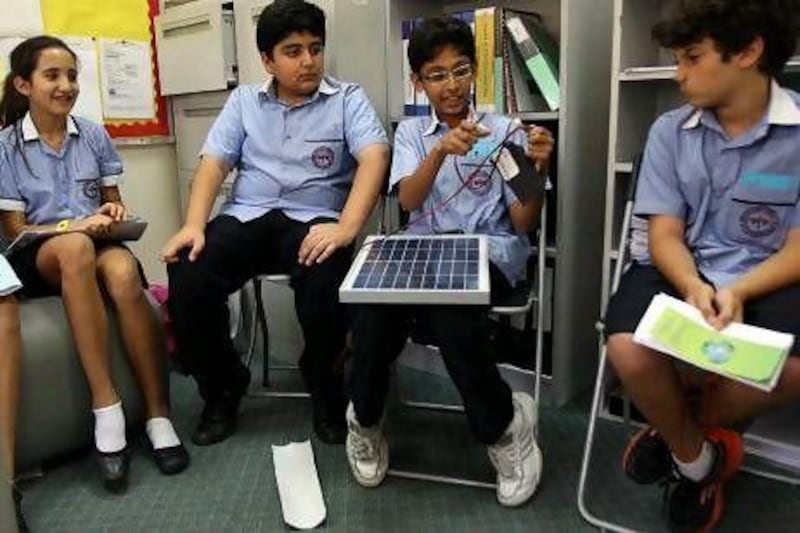DUBAI // A group of Grade 6 pupils in Dubai want to convince schools across the country to convert to solar energy - and save up to Dh1 million a year on their electricity bills.
If their mission, under the banner "Make A Difference", is successful, the students at Emirates International School Jumeirah estimate that schools can reduce electricity usage by 20 per cent.
"Any given school spends between Dh800,000 to Dh1 million a year on electricity charges in order to keep buildings air-conditioned and grounds well-lit," said Jordanian-American Yasmin Dajani, 11, one of the students in the project.
According to Yasmin, with the initiatives underway at Abu Dhabi's Masdar City, now is the ideal time to start pitching the importance of renewable energy to school administrators and the UAE government.
"With a year-round sunny climate, schools adopting a solar power panel solution would reduce their electricity bills by 20 per cent, while at the same time conserving energy, fuel consumption and carbon emissions," said Yasmin.
The project marks the end of the students' International Baccalaureate Primary Years Programme (PYP) - for youngsters aged three to 11 - before they enter the IB Middle Years Programme.
The students have been distributing flyers and brochures as part of their project, which will be exhibited at the school on Wednesday,
"I didn't know much about solar power before," said Varun Kitson, 11, from India. "People need to be aware that solar power is an alternative source of energy and that they should stop using oil because it's going to run out; that's how we would like to make a difference in the UAE."
The team has also created a Facebook page - called Go Green, Go Green.
"We want this to go even further and make it part of Abu Dhabi's 2030 vision, so that this country is a good place to visit," said Maria Naguib, 11, from Egypt.
According to Marinda van Niekerk, the school's deputy principal, the goal of the PYP programme is to convert knowledge into skills.
One of the teachers facilitating the project, Teresa MacDonald, said the students have done everything themselves.
"The PYP programmes give them a lot of freedom to do what they need to do," she said, adding that the results have been "very impressive".
The students contacted Tom Georgeson, the programme manager of the Solar for Schools project at Dubai-based company, PLT Solar, which distributes and helps install solar panels.
Mr Georgeson said schools are "ideally suited" for solar panels because they operate during the day. Some already use solar panels to light car parks and gardens.
"The panels can be located very easily on flat roofs, and I can imagine schools would like to have it on show, so people can see they use solar power," said Mr Georgeson.
Cost-wise, he estimates there is an approximate 10-year payback period.
The price for solar energy is falling, but it will fall even further if the panels are connected to the main power grid. Currently none of the UAE's private solar power panels are being fed into the national grid.
This is where the Dubai Electricity and Water Authority (Dewa) comes in, said Mr Georgeson, who is helping to install a trial grid connection system. However, he said "a lot of rules and regulations need to be overcome" before it is finalised.
Dewa recently announced the development of a 1,000 megawatt solar park in Dubai, worth Dh11.5 billion, to supply five per cent of the UAE's power needs by 2030. The first 10 megawatts - around 77,000 solar panels - are to be installed and connected to the grid by the middle of next year.





